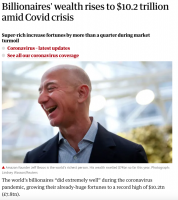Interesting article (for once) in the Guardian.
The Hall quote “Politics does not reflect majorities, it constructs them.” feels apt. Having watched QT last night and scanned local online responses here to Sunak’s statement there is a disturbing acceptance that there is a logic to the strategy.
The conflation of personal debt and sovereign fiat seems to remain embedded in popular consciousness.
We’ve had Nick Robinson demand of Sunak that he makes himself ‘tough enough’ to impose a new layer of austerity on already battered communities.
What’s left of the left should be focusing its efforts on how this might be countered, and in a way that ordinary people can understand. But instead.......silence....
The chancellor seems intent on cementing the deal that gave Johnson his landslide, says Guardian columnist Aditya Chakrabortty

www.theguardian.com







